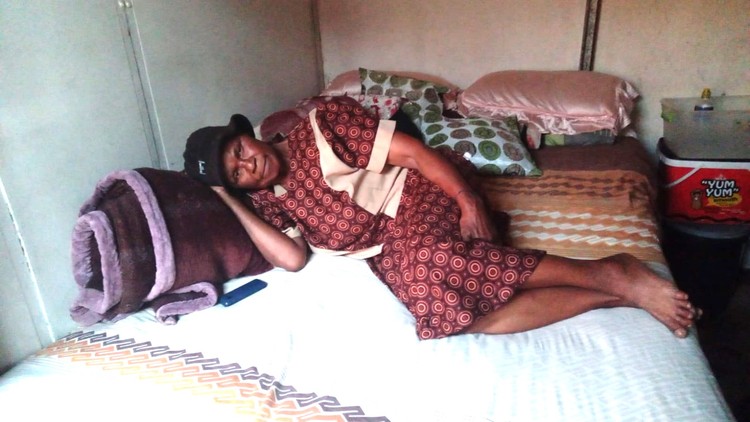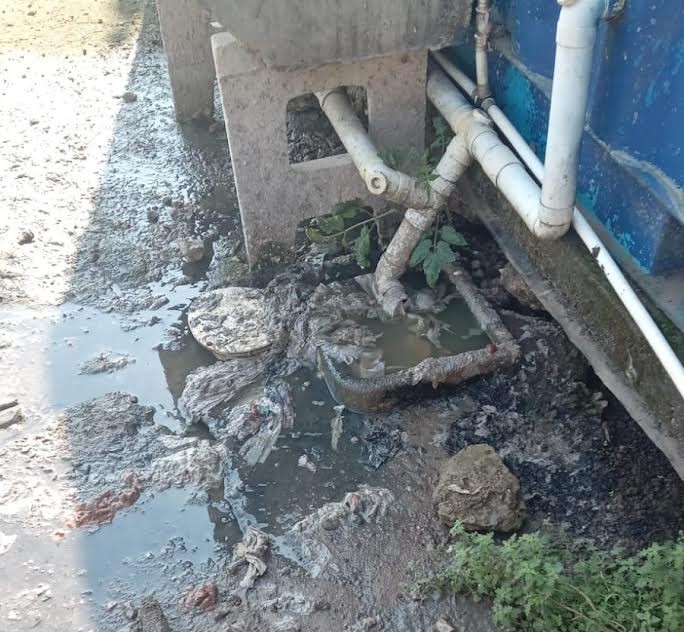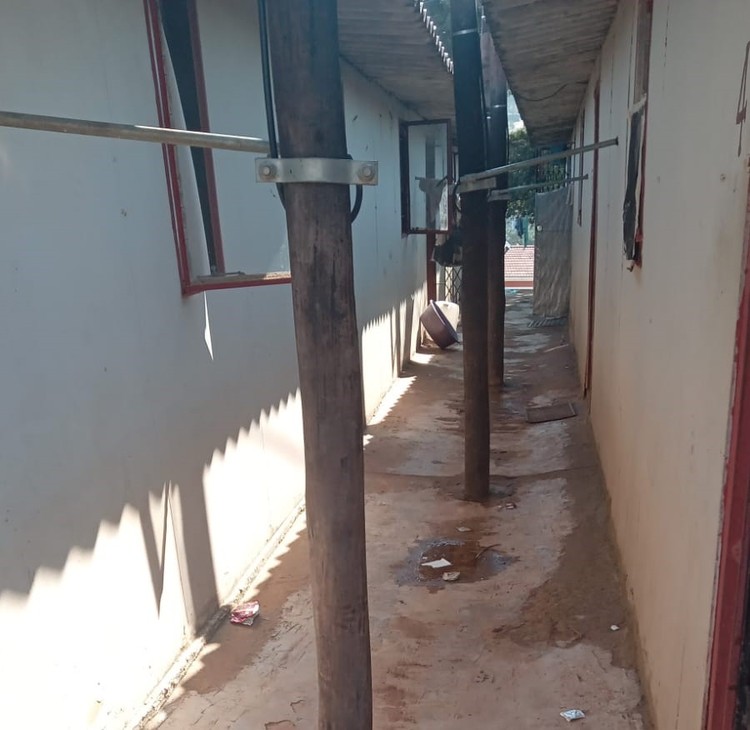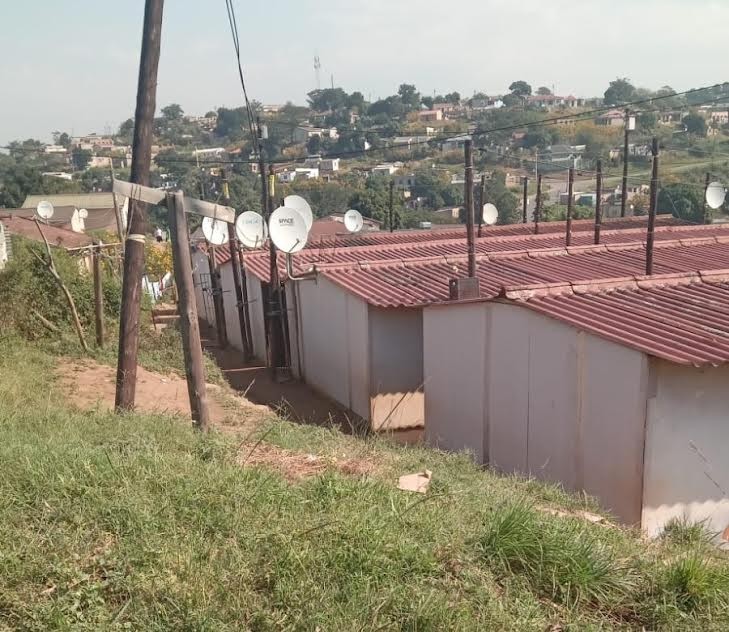“You have no idea how difficult it is to get a coffin inside the camp”
After 13 years in a “transit camp”, Ntuzuma flood victims are afraid they’ll die there
Thokozile Mbonambi, 76, is afraid of dying in the “transit camp” where she has lived for 13 years. Photos: Nokulunga Majola
- About 20 families have been living in the Ntuzuma “transit camp” since 2011 when they were moved from their homes after floods.
- Some elderly residents are afraid they will die there.
- Roof sand walls of the houses are leaking; the camp is full of human waste because the communal toilets are blocked and there is little or no water to flush them.
- The eThekwini municipality says delays moving the families to a new housing development are the result of “tender appeals in the procurement process”.
All Gogo Thokozile Mbonambi wants is to die in a decent house where her coffin won’t have to go through other people’s houses to get to hers.
Mbonambi, 76, lives in one room at the Ntuzuma C Transit camp in eThekwini with her four grandchildren. Hers is one of 21 families who have been living in this camp since they were moved here after the floods in 2011.
She says her hope of a new home is slowly disappearing as the years go by. “The struggle is real here. We face so many challenges but what hurts me the most is that I will die here without having a home of my own,” she said.
There are two ablution facilities, one for men and one for women. Taps, stalls, doors and windows are broken. The toilets are blocked and residents have to flush with buckets of water they collect from the river or from the water tanker when it comes. There is human waste all over the settlement.
Mbonambi says her grandchildren have to help her to get water and when she has to go to the toilet, someone has to carry the bucket for her to flush. Two other elderly people live in this place. One of them is blind and it is difficult for her to go to the toilet, especially at night.
“Life is hard here, we need the authorities to give us answers as to when we are going to be moved to our homes as promised,” she says.
Toilets are blocked and drains are flooded.
Residents say representatives of various political parties have visited the camp to make promises but they leave it just as they came, with nothing.
Another resident, 52-year-old Thuleleni Ngubane, who lives with her seven children and 13 grandchildren, says over the years representatives of the eThekwini municipality have also come several times to tell the families that their problems would be solved but they are still waiting.
“When we first moved here, we had no electricity and we used izinyoka. In time the municipality came and provided us with legal electricity, but now the issue is water. Since the floods in 2022, we haven’t had water in the one standpipe that we have here. A water tanker comes once a week and it’s not enough for everyone,” says Ngubane.
She says people are worried about dying in this place that is so undignified. “Six people have died here in recent years and you have no idea how difficult it is to get a coffin inside the transit camp as the passages are very small. The coffin will have to enter the house next door before yours.”
Passages between houses are too narrow to allow a coffin to pass easily.
“This is not a life we want to live, we were better off where we were before,” says Ngubane.
“We need change and for the City to give us answers, how long are we going to be living here and when are they fixing all the problems that we currently face in this transit camp.”
In answer to GroundUp’s questions, City of eThekwini spokesperson Gugu Sisilana said the families in the camp are to be rehoused at Ntuzuma C Phase. She said the municipality is currently finalising a contract to install roads, water and sewerage. Construction should start in July.
Asked why it had taken so long, she said the delays are caused by tender appeals in the procurement process, which are beyond the municipality’s control.
Asked about fixing up the camp in the meantime, she said a programme of repairs of infrastructure within all transit camps in the City had started as a short-term solution and R500,000 had been set aside per camp. “Repairs in this transit camp will be attended to and completed during the course of the year as and when service-related issues are identified.”
Asked what the municipality was doing to make sure conditions in transit camps meet basic living standards, Sisilana said: “A dedicated social facilitator from the Human Settlements Phoenix Offices has been assigned to communicate with residents of this transit camp on a weekly basis.”
But Ngubane says no-one from the municipality has been in the camp since 5 March, when some officials from the housing department came to take people’s details. She has never seen a “social facilitator”.
The municipality says delays building new houses for the camp residents have been caused by “tender appeals” in the procurement process.
Support independent journalism
Donate using Payfast

Don't miss out on the latest news
We respect your privacy, and promise we won't spam you.
Next: City of Cape Town backtracks on housing agreement with Mfuleni backyarders
Previous: Deadline for comment on City of Cape Town’s new homeless strategy
© 2024 GroundUp. This article is licensed under a Creative Commons Attribution-NoDerivatives 4.0 International License.
You may republish this article, so long as you credit the authors and GroundUp, and do not change the text. Please include a link back to the original article.
We put an invisible pixel in the article so that we can count traffic to republishers. All analytics tools are solely on our servers. We do not give our logs to any third party. Logs are deleted after two weeks. We do not use any IP address identifying information except to count regional traffic. We are solely interested in counting hits, not tracking users. If you republish, please do not delete the invisible pixel.




